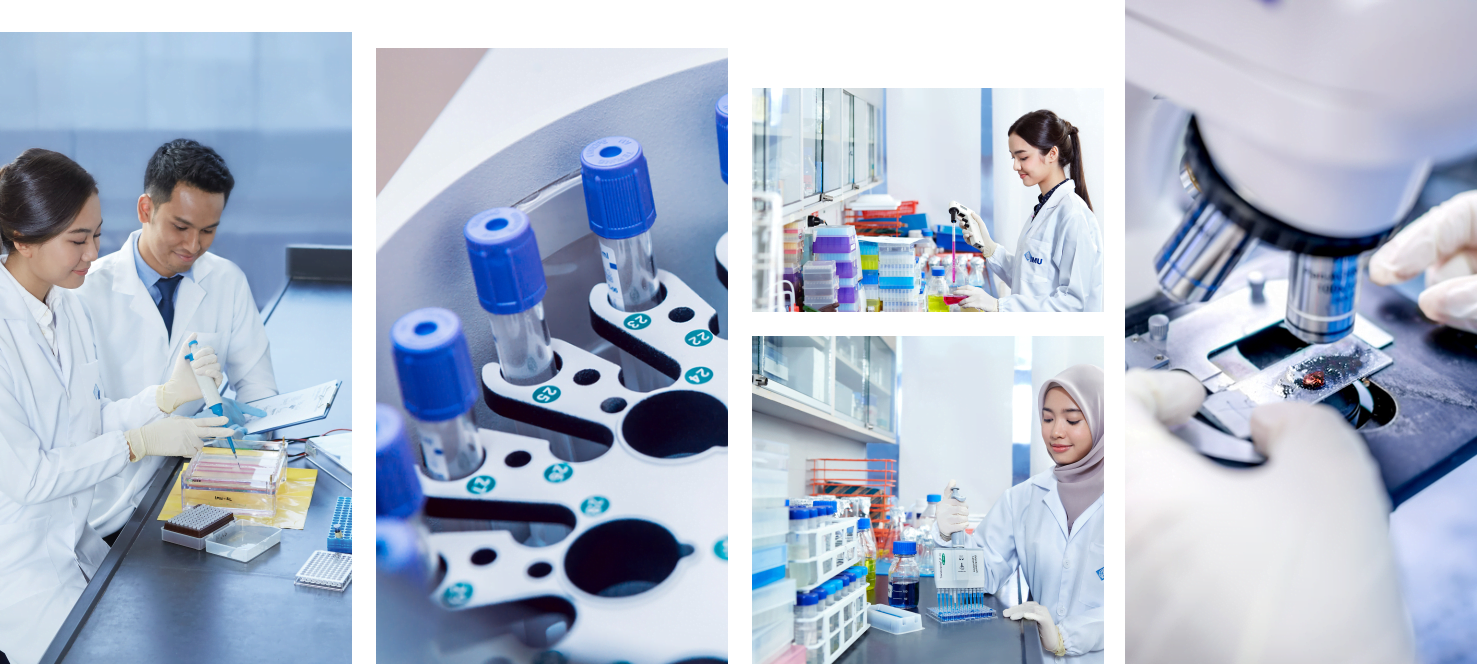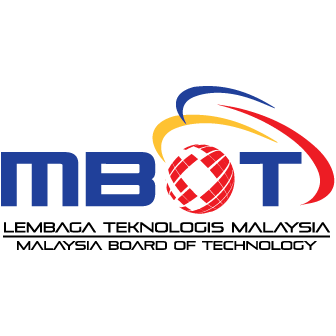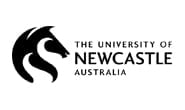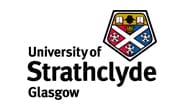ABOUT
Science has seen mankind’s quality of life improve by leaps and bounds since the bubonic plague plunged Europe into the Dark Ages. As much as scientific progress in vaccines has resolved historically deadly diseases such as polio and others, the continual emergence of new and old diseases emphasizes the importance of medical biotechnology to improve healthcare delivery.

Medical Biotechnology Degree
Even though you may not be aware of this Biological discipline in secondary schools in Malaysia, medical biotechnology has been in existence for centuries. From the early days of diseases where medicine alone could not save dying people from very simple bacterial infections, medical biotechnology has grown out of necessity to save human lives. Medical Biotechnology is a subset of medicine and biotechnology that teaches us how to use any living organisms to come up with products to help us live long and more productive lives.
We are all exposed to and have benefitted from Medical Biotechnological discoveries from Edward Jenner’s creation of vaccination for small pox, to the use of DNA technology to identify SARS-CoV-2, inherited diseased genes, and human remains, to advances in vaccine development using mRNA and adenoviral vector platforms. During the last few years we have seen the amazing yet controversial progression of gene editing experiments by growing human organs in animals for future transplantation, to the current use of DNA biotechnology in viral detection and development of a viable vaccine against the SARS-CoV-2 virus responsible for the COVID-19 pandemic. The use of genomic sequencing has revolutionised and assisted us in identifying and characterising the pathogenicity of the SARS-CoV-2 variants (delta, delta-plus, mu, omicron, xbb and bq variants).
All the information from science subjects that you have studied in secondary and high schools are amongst some of the key courses you will study in Medical Biotechnology such as Forensic Science, Molecular Medicine, Biopharming, Medical Microbiology and Parasitology, Stem Cell, Data Analytics and Omics Technology. Medical Biotechnology students at IMU will also learn how to contribute towards developing beneficial products to prevent and treat human diseases, learn how to communicate your findings to the general public and eventually market your own biotechnology products and set up your own biotechnology companies. Amongst the teaching methodologies conducted in the programme include: face-to-face as well as virtual lectures, hands-on laboratory practical, small group teaching (problem based learning and tutorials), workshops, computer-aided learning (CAL), seminars, presentations, industrial visits, video reviews, internships with our partner schools in Australia, guided reading and portfolio as well as original and independent research work. In addition, the annual event of Graduated Preparedness Advisory Committee (GPAC) enables students to obtain insights from our biotechnology industry partners and in preparing students to the future market needs through a series of forums with relevant industries. As preparation for the workplace/internship, in Year 3, the students will participate in peer-review feedback as part of the learning to self- and peer-critique in preparation for challenges faced in the workplace/graduate school.

MBOT is a professional body that recognises and registers graduates with specific skills in the areas of technology. The Medical Biotechnology programme at IMU has obtained accreditation from MBOT, and with this recognition, our graduates are eligible to register as certified Graduate Technologists (GT). Certification as GT should assist our graduates in securing viable careers in the workforce locally and abroad.
Key Facts
Why Study Medical Biotechnology at IMU?
An Established Private Healthcare University
IMU is Malaysia’s first and most established private medical and healthcare university with over 30 years of dedicated focus in healthcare education.
IMU achieved the SETARA-2018/2019 Tier 6 status (Outstanding) under the Mature University category.
Build Your Future Healthcare Professional Network
As IMU offers the widest range of healthcare programmes, our students are fully immersed in a vibrant community of students and practitioners from all healthcare fields.
This allows for the development of strong friendship amongst peers that will be the foundation of an extensive healthcare professional network upon graduation.
Curriculum Benchmarked to International Standards
IMU’s Medical Biotechnology curriculum is aligned with the Malaysian biotechnology priorities and it has been developed to meet high international standards and is accepted by University of Newcastle, Australia for credit transfer into their programme.
Exposure to Entrepreneurship
With enterprise management as part of the curriculum, students will be able to have a better understanding of biotechnology-related business matters which can transform their future careers.
Well-Established Rapport with BiotechnologyBased Industries and the Bioeconomy Corporation
IMU works closely with biotechnology-based industries and the bioeconomy corporation for industrial attachments locally or abroad and latest information on the industry.
Programme Structure
Semester Contents
| Short Semester | Semester 1 | Semester 2 |
|---|---|---|
* Malaysian students |
|
|
| Semester 3 | Semester 4 | Short Semester 1 |
|---|---|---|
Choose 1 elective module |
|
* Choose 1 elective module |
| Semester 5 | Semester 6 | |
|---|---|---|
*Choose any 3 elective modules |
|
|
Entry Requirement
| Examinations | Requirements |
|---|---|
| A- Levels | CDD (including 2 Science subjects / Mathematics) And Credit in Mathematics, one science subject and one other subject at SPM level. (This can be exempted if achieved the same result at Pre-University level) |
| STPM | CC (including 2 Science subjects / Mathematics) And Credit in Mathematics, one science subject and one other subject at SPM level. (This can be exempted if achieved the same result at Pre-University level) |
| Australian Matriculation | ATAR 60 (including 2 Science subjects / Mathematics) And Credit in Mathematics, one science subject and one other subject at SPM level. (This can be exempted if achieved the same result at Pre-University level) |
| NCEA Level 3 | 60% aggregate (including 2 Science subjects / Mathematics) And Credit in Mathematics, one science subject and one other subject at SPM level. (This can be exempted if achieved the same result at Pre-University level) |
| Canadian Grade 12/13 | 60% aggregate in 6 subjects (including 2 Science subjects / Mathematics) And Credit in Mathematics, one science subject and one other subject at SPM level. (This can be exempted if achieved the same result at Pre-University level) |
| Unified Examination Certificate (UEC) | B in 5 subjects (including 2 Science subjects / Mathematics) And Credit in Mathematics, one science subject and one other subject at SPM level. (This can be exempted if achieved the same result at Pre-University level) |
| Australian University Foundation Programmes | 60% aggregate or ATAR 60 (including 2 Science subjects / Mathematics) And Credit in Mathematics, one science subject and one other subject at SPM level. (This can be exempted if achieved the same result at Pre-University level) |
| Indian Pre-University | Average of 60% (including 2 Science subjects / Mathematics) And Credit in Mathematics, one science subject and one other subject at SPM level. (This can be exempted if achieved the same result at Pre-University level) |
| Ministry of Education Matriculation # | cGPA 2.00 (including 2 Science subjects / Mathematics) And Credit in Mathematics, one science subject and one other subject at SPM level. (This can be exempted if achieved the same result at Pre-University level) |
| International Baccalaureate (IB) | 26 points (including 2 Science subjects / Mathematics) And Credit in Mathematics, one science subject and one other subject at SPM level. (This can be exempted if achieved the same result at Pre-University level) |
| American High School Diploma with Advanced Placement (AP) | cGPA 2.00 And Credit in Mathematics, one science subject and one other subject at SPM level. (This can be exempted if achieved the same result at Pre-University level) |
| Foundation Studies # | IMU Foundation in Science/ Foundation in Biosciences / Foundation in Engineering or equivalent cGPA 2.00 or 50% (including 2 Science subjects / Mathematics) And Credit in Mathematics, one science subject and one other subject at SPM level. (This can be exempted if achieved the same result at Pre-University level) |
| Degree | BSc in related field: cGPA 2.00 |
| Diploma | Diploma in Science (UiTM), Diploma in Microbiology (UiTM) – cGPA 2.50 Diploma in related field – cGPA 2.00 |
# The duration of this programme must be a minimum of 1 year in the same accredited institution and foundation in other disciplines are accepted.
Minimum credit in Mathematics, one science subject and one other subject at SPM level. Students may be exempted from the above requirement if they achieved the same results at Pre University level.
English Language Requirement
| MUET* | Band score of 3; or (For Malaysian students) |
| IELTS | Overall band score of 5.5; or |
| TOEFL iBT* | Overall score of 46; or |
| Cambridge English : Advanced (CAE)* | Overall score of 162; or |
| Cambridge English : Proficiency (CPE)* | Overall score of 162; or |
| Cambridge Linguaskill* | Overall score of 160; or |
| Pearson Test of English (PTE)* | Overall score of 51; or |
| Credit Transfer | IELTS Overall band score of 7.0 |
The following categories of students* are exempted from the English requirements:
Students who graduated from other institutions where the curriculum is delivered in English Language for example: Advanced Levels / Australian Matriculation / Australian University Foundation Year / Canadian Matriculation / International Baccalaureate / Foundation in Science / Other Pre-University/ Programmes from Local Higher Education Institutions
* ONLY applicable for those who are completing the entire degree at IMU, Malaysia
Note
Please note that achieving the minimum Entry and English requirements as stated does not guarantee you admission into any of IMU’s programmes.
Please refer to our Student Admissions Policy for more information
Application and Registration Fees
| Fee | Malaysian Student (RM) | International Student (RM) |
|---|---|---|
| Application Fee | 150 | 500 |
| Registration Fee | 850 | 2,000 |
| Refundable Caution Deposit | 1,000 | 1,000 |
Fee Structure
malaysian student
| Total Duration (years) | At IMU University | At Partner University (PU) | ||||||
|---|---|---|---|---|---|---|---|---|
| Years | Total Semesters | Tuition Fee (RM) | Estimated Tuition Fees at Partner University | |||||
| Per Semester | Per Year | Years | Semesters | Tuition Fee Per Year * | ||||
| Bachelor of Applied Science (Hons) Medical Biotechnology | 3 | 3 | 6 | 21,000 | 42,000 | – | – | – |
| Credit Transfer to University of Newcastle Bachelor in Biotechnology |
3½ | 1½ | 3 | 21,000 | 42,000 | 2 | 4 | A$43,320 |
| Direct Transfer to University of Strathclyde** MSc Industrial Biotechnology (3+1) |
4 | 3 | 6 | 21,000 | 42,000 | 1 | 2 | £27,500 |
| Direct Transfer to University of Strathclyde** MSc Forensic Science (3+1) |
4 | 3 | 6 | 21,000 | 42,000 | 1 | 2 | £28,950 |
International Student
| Total Duration (years) | At IMU University | At Partner University (PU) | ||||||
|---|---|---|---|---|---|---|---|---|
| Years | Total Semesters | Tuition Fee (RM) | Estimated Tuition Fees at Partner University | |||||
| Per Semester | Per Year | Years | Semesters | Tuition Fee Per Year * | ||||
| Bachelor of Applied Science (Hons) Medical Biotechnology | 3 | 3 | 6 | 22,000 | 44,000 | – | – | – |
| Credit Transfer to University of Newcastle Bachelor in Biotechnology |
3½ | 1½ | 3 | 22,000 | 44,000 | 2 | 4 | A$43,320 |
| Direct Transfer to University of Strathclyde** MSc Industrial Biotechnology (3+1) |
4 | 3 | 6 | 22,000 | 44,000 | 1 | 2 | £27,500 |
| Direct Transfer to University of Strathclyde** MSc Forensic Science (3+1) |
4 | 3 | 6 | 22,000 | 44,000 | 1 | 2 | £28,950 |
| Country | Estimated Living Costs (Per Year) |
Exchange Rate (As of Dec 2023) |
|
|---|---|---|---|
| Estimated Living Cost (Per Year) | Australia | AUD 21,000 – AUD 30,000 ≈ RM 65,900 – RM 94,200 | AUD 1 ≈ RM3.14 |
| Canada | CAD 28,000 ≈ RM 98,000 | CAD 1 ≈ RM3.50 | |
| China | RMB 85,000 ≈ RM 56,100 | RMB 1 ≈ RM0.66 | |
| Ireland | EUR 12,000 ≈ RM 62,000 | EUR 1 ≈ RM5.17 | |
| New Zealand | NZD 22,000 – NZD 26,000 ≈ RM 64,500 – RM 76,200 | NZD 1 ≈ RM2.93 | |
| United Kingdom | GBP 10,000 – 22,700 ≈ RM60,000 – RM 136,200 | GBP 1 ≈ RM6.00 | |
| United States of America | USD 16,000 ≈ RM 75,800 | USD 1 ≈ RM4.74 | |
| Kuala Lumpur, Malaysia | RM36,000 | RM36,000 |
Partner Universities
As an assurance of a total commitment towards quality education in medical biotechnology, the IMU maintains its relationship with partner university in Australia and United Kingdom. Eligible graduates from IMU’s medical biotechnology programme can enrol into King’s MSc in MedTech Innovation & Entrepreneurship at King’s College London, United Kingdom.
Australia
united kingdom
Industrial Partners
The curriculum structure is constantly updated to meet the ever-changing industries’ needs and includes research-led teaching to deliver evidence-based knowledge and practice in the industry. Students will have the opportunity to undergo industrial training in the related sectors in their final semester. They will also be able to collaborate with industry or/and researcher in related project in their final year. The organisations involved in these internships are:
Views from Our Community

Yeo Ee Lin
Alumna, Medical Biotechnology
The Medical Biotechnology programme at IMU and the IMU lecturers have prepared us well for a real work environment not only in equipping us with laboratory skills, but also in soft skills such as communication skill and time management. Sufficient number of practical classes and opportunities for each of us to conduct an experiment are provided by this programme. This ensures that we can practice and learn more before we get into industrial training.

Christopher Naythan Ravi
MB116 – Alumnus, Medical Biotechnology
IMU Medical Biotechnology programme has prepared me in a lot of ways for this industrial training such as giving me the insight that medical biotechnology is not just about being in the field of research but it can be so much more such as in the marketing department, regulatory affairs and many more. Besides that, all the courses provided in the medical biotechnology programme were very beneficial especially the organic chemistry modules as it helped me understand the fundamentals to be able to move through easily in the chemical and chromatography department.

Kok Li Shan
Alumna, Medical Biotechnology
I particularly selected the medical biotechnology programme at IMU because the curriculum suits my preference of wanting to learn more of both medical and technology related contents. True enough, the curriculum was up to my expectations and some even were more than what I had expected. In general, the programme was well planned out in terms of helping me to gain knowledge, develop new skills and apply it at the late stages of the course. I was excited as additional workshops; communication classes and entrepreneur classes were included in this technology-based programme. These sessions were very useful for self-development and prepared me more readily for the workforce in the future. The additional skill set, exposure to related industries and inter-professional learning have also enlightened me. I felt that the programme had nurtured me with valuable knowledge, equipped me with essential skills and techniques and prepared me towards being a health science professional.

Chiang Jun Wei
MB118 – Student, Medical Biotechnology
Now, I know that studying Medical Biotechnology could make me be someone that I wanted to be, to help alleviate suffering of people through innovation of drugs to treat diseases. In fact, as I learn more about biotechnology, I find out that being a biotechnologist is not just a job which one will only work in a laboratory as a researcher, but it actually provides a lot of job opportunities in many different field, including government agency for policy regulation, pharmaceutical and technology companies, as a product specialist, etc.
Latest News & Stories
Frequently Asked Questions
Why choose this programme?
Biotechnology applies scientific and engineering principles and practices to utilise biological resources for development of mankind. Medical Biotechnology applies the wealth of knowledge in biotechnology for the advancement of health sciences.
What is the structure of the programme?
Semester contents are available in the programme brochure [Download Brochure]
Have a Question? Ask Us
Interested in Applying for One of Our Programmes?
Having Issues with Your Online Application Process?
Need Assistance?
A Word from the Programme Director

TS DR YEANNIE YAP HUI YENG
Senior Lecturer and Programme Director
BSc (Hons) (UTAR), PhD (UM)
“Medical biotechnology is a fast-evolving field that blends biology and technology to develop solutions for diagnosing, treating, and preventing diseases. The Medical Biotechnology programme at IMU offers a transformative learning experience, equipping students with practical skills and cutting-edge knowledge. Internships with biotechnology companies, government bodies, and international organizations provide valuable industry exposure, while modules on communication, problem-solving, and entrepreneurship enhance essential skills. Our dedicated faculty, with extensive expertise, guide students toward successful careers in the healthcare and biotechnology sectors.”















